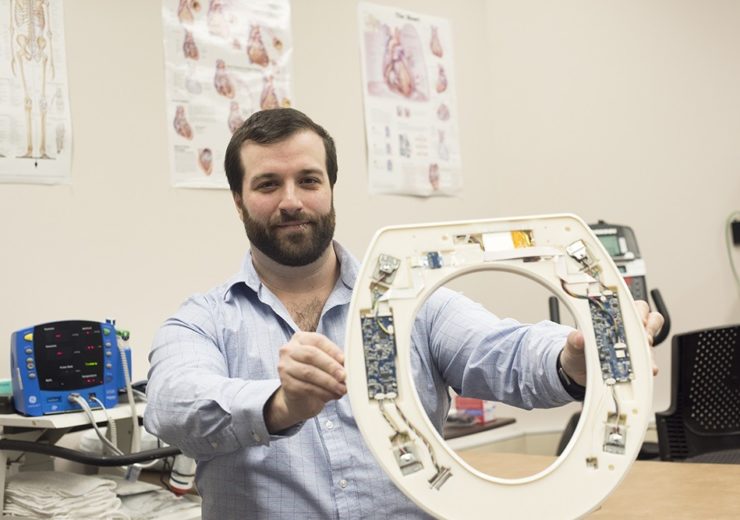Smart toilet seat for early detection of heart failure and cardiovascular monitoring measures biometrics during 'natural' processes will be commercialised

Nicholas Conn, CEO of Heart Health Intelligence (Credits: A. Sue Weisler/RIT)
A smart toilet seat has been launched by researchers at the Rochester Institute of Technology (RIT), which conducts cardiovascular monitoring.
The team, who formed the spin-off company Heart Health Intelligence, claim it will help heart failure patients detect unnoticed symptoms before they become life-threatening, with the aim of reducing both healthcare costs and hospital readmission rates.
There are more than one million new cases of congestive heart failure diagnosed each year, and it is hoped the battery-powered seat will improve patient outcomes through early intervention in the comfort of their homes.
Bausch and Lomb professor of microsystems engineering at RIT David Borkholder carried out the feasibility In-Home Cardiovascular Monitoring System for Heart Failure: Comparative Study, which proved the viability of the smart toilet seat.
“Integration of the sensor systems into a toilet seat addresses a key challenge of successful in-home monitoring: Adherence,” he said.
“Ultimately, this data can provide alerts to physicians to enable proactive interventions that keep people in their homes and out of the hospital.”
“Heart Health Intelligence is working to commercialise the technology and will be bringing it through the FDA approval process with the goal of transforming the landscape of cardiovascular care.”
The seats are installed with algorithms to measure and analyse the data and will soon comprise features to alert healthcare providers of a deteriorating condition with reports to provide cardiologists who will decide if an intervention is required.
What key benefits do the smart toilet seats provide for cardiovascular monitoring?
The toilet seat-based cardiovascular monitoring system is equipped to measure the electrical and mechanical activity of the heart, and can monitor blood pressure and oxygen levels.
It can also measure a high-risk patient’s weight and stroke volume – the amount of blood pumped out of the heart at every beat.
Heart Health Intelligence, which joined RIT’s Venture Creations business incubator this year, plans to commercialise the technology for hospitals to purchase at almost $2,000 (£1,500) per smart seat, after securing FDA clearance.
Mr Borkholder said: “Patients often do not take their vitals, or even measure their weight as directed by their physician.
“This results in significant gaps in data collection, and creates challenges in early detection of health deterioration.
“The toilet seat addresses this challenge by integrating the sensing modalities into a form factor that requires no proactive effort by the patient at all.”
The cloud-connected seat is fully automated and waterproof, which can be fixed on top of existing toilet equipment.
According to the report published in the JMIR mHealth and uHealth, the smart toilet seat is a convenient device as it integrates naturally into the patient’s daily routine with no change in habit, enabling measurements to be taken at one or more times each day.
In addition, the inventors explain the legs are an ideal location for this monitoring to take place because the aorta is the body’s largest artery and connects into the thighs.
Mr Borkholder added: “Data is collected automatically when the patient sits on the seat and is transferred to a secure cloud infrastructure for analysis.”
